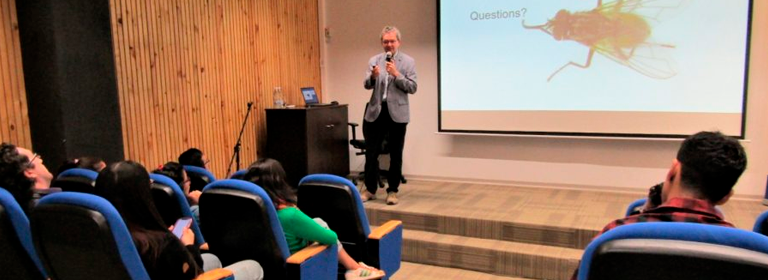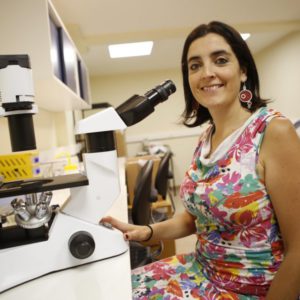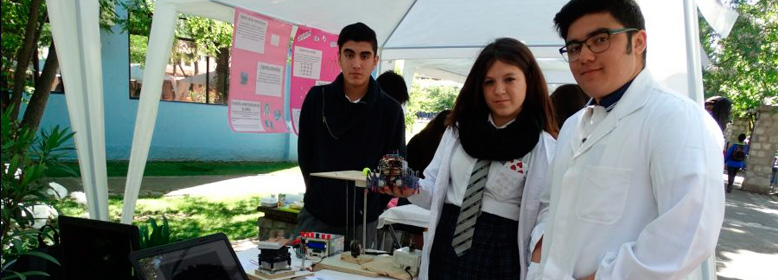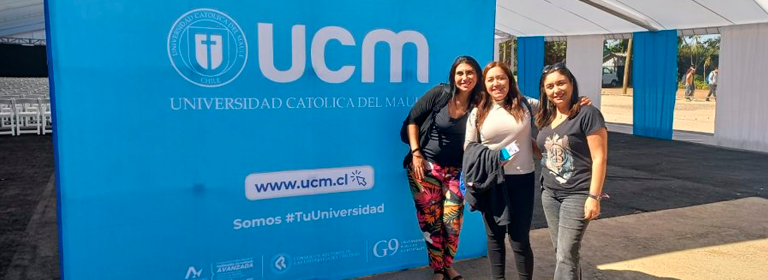The rector of the campus, Dr. Claudio Rojas Miño, said that the postgraduate course is unprecedented for its transdisciplinary nature.
 With a lecture on reproduction in insects, the Universidad Católica del Maule (UCM) inaugurated the first Doctorate in Ecosystemic Health in Chile.
With a lecture on reproduction in insects, the Universidad Católica del Maule (UCM) inaugurated the first Doctorate in Ecosystemic Health in Chile.
The postgraduate course, taught by the Center for Research and Advanced Studies of Maule (CIEAM, by its initials in Spanish), belonging to the campus, follows the avant-garde approach of «One Health», in an unprecedented interdisciplinary approach among doctorates at the national level.
«It is unprecedented for its transdisciplinary nature. It is also focused on a global problem of the present and future. When we talk about the great problems that are happening to us right now as humanity, such as COVID-19 and diseases that compromise human, animal, and environmental health, we know that we are facing a great issue for the next thirty years,» said UCM’s rector, Claudio Rojas Miño, who led the launching of the program.
The doctorate will not renounce to the solid training in disciplinary fields,» he said, «but will provide methodologies and mechanisms to address these problems, which tend to be complex due to the number of variables and dimensions involved.
«One Health» corresponds to a concept proposed by the Wildlife Conservation Society at its 2004 conference in New York, with the purpose of identifying the nascent collaborative efforts of multiple disciplines to achieve optimal ecosystem health in a more holistic manner.
«For us as the UCM, this is a challenge that involves looking for scientific tools to combat, for example, climate change, which has brought terrible pandemics such as Covid-19, and to learn more about zoonotic diseases. Today we are facing avian flu, and understanding how these diseases are connected to the environment and animals and preventing them from reaching humans is one of the objectives», said the director of the postgraduate course, Hugo Benítez.
 Learning from insects
Learning from insects
The inaugural lecture was given by a reference in Evolutionary Genetics, who arrived at the San Miguel campus from the Netherlands. Dr. Leo Beukeboom, professor at the University of Groningen and co-author of the book «The Evolution of Sex Determination», focused his presentation on the reproductive modes of insects and their breeding for human and animal food.
«Many of the genes that cause disease in humans are the same as those in insects. By studying insect genetics, which are easier to manipulate, you learn a lot about human genetics,» he said.
The also pest control expert added that even the smallest organisms are part of a link of interactions.
“I always tell my students that every insect or stage of an insect, whether it is an egg, larva or pupa, is the enemy of some other species, and so if you take it out of the ecosystem there will perhaps be many other insects, which until then had a reduced population. We may not like mosquitoes, but we are all part of an ecosystem,» he said.
The postgraduate course in Ecosystem Health will begin classes in two weeks with students from Chile, Brazil, and Colombia.













